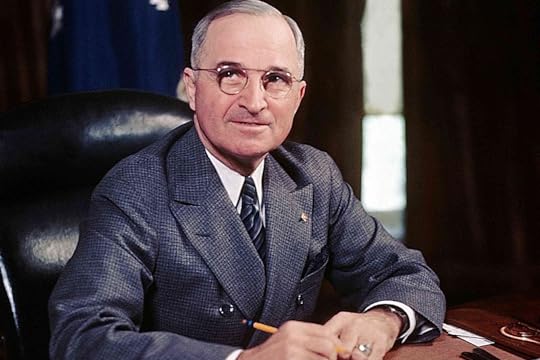A history lesson—and an absorbing book

From time to time, someone onFacebook asks about everyone’s earliest memory of a public event. I am notquite old enough to remember Pearl Harbor, but I’ve been told about the momentmy family knew so often that I almost feel I remember. I would have been three,and I was playing on the kitchen floor while Mom worked in the kitchen. Dad, aveteran of WWI, stuck his head in the door and said, “We are at war.” It was amomentous thing, and my parents told the story over and over.
The first public memory I haveis of the death of Franklin Delano Roosevelt. We lived on a park, and I wasoutside playing, probably with neighbor children. I had been raised in ahousehold where FDR was a minor god, and I assumed everyone loved him as muchas my parents did. Not so. This day a woman jumped out of her car and shouted, “Hooray!Hooray! Roosevelt is dead.” I went home and told my mom, who said, “Don’t talklike that.” Soon enough, she found out it was true.
Now a book recommended by afriend is bringing back all those memories and more. The book is TheAccidental President: Harry S. Truman and the Four Months that Changed theWorld, by A. J. Baime. From the blurb to the book: “The first four months of Truman’s administration sawthe founding of the United Nations, the fall of Berlin, victory at Okinawa,firebombings in Tokyo, the first atomic explosion, the Nazi surrender, theliberation of concentration camps, the mass starvation in Europe, the PotsdamConference, the controversial decision to bomb Hiroshima and Nagasaki, thesurrender of imperial Japan, and finally, the end of World War II and the riseof the Cold War. No other president had ever faced so much in such a short periodof time.”
Trumanwas the most unlikely man—accidental is a good term—to deal with suchchallenges. Small, bespectacled, from a poor family, and until he was in histhirties and assumed a military command, a failure at almost everything hetried. The only thing he didn’t fail at was his courtship of Bess Wallace, andit took him years to convince her to marry him--and then more years before hefelt he could support her. Even then, he moved into her family’s home and livedunder the disapproving eye of his mother-in-law. He lost the first election hetried, but won later ones, and with the help of Kansas City political boss TomPrendergast, found himself vice-president of the United States.
Rooseveltalmost didn’t know who he was, never involved him in the policies and problemsof government. He had little to do, as vice president, besides preside overSenate meetings. All that changed on April 12, 1945, when FDR died. It was asudden death but should not have been a surprise—the president had been in failinghealth for some time.
ForTruman it all happened in a whirl—the call to the White House, the swearing in,and then he went back to the modest apartment he shared with his wife anddaughter, Margaret (he called her Margie, with a hard “g”). The telling of allthis is full of names that now I remember, whether from the actual time or fromthe history books-- Alben Barkley, Dwight Eisenhower as a general and not a president,General George C. Marshall, Frances Perkins, the labor secretary and firstfemale member of the Cabinet, Generals Omar Bradley and George Patton. And itfills in m knowledge of those crucial days—the apparent collapse of the Nazi regime,the discovery of the first concentration camp, the conference between Stalin,Churchill, and FDR at Yalta.
Thereis one object lesson here that I wish today’s Republicans could take to heartas they resist funding Ukraine in its efforts to stop Russia from greedilyabsorbing more and more territory, as it has done with Crimea. After theagreement at Yalta, Stalin backtracked on all that he had promised, such asaccess for international troops to Poland and other Russian-occupiedterritories. Russia could not be trusted then, and it cannot be trusted today.
HistorianHeather Cox Richardson writes an amazing daily column, “Letters from anAmerican,” in which she uses history to help readers understand today’s world, withall its conflicts, and the importance of our democracy. Her work is a livingembodiment of the familiar caution that he who does not know history is doomedto repeat its mistakes. Another reason to fear the rampant censorship of whatis taught in our schools today. Baime, in this book, also uses history to helpus understand leadership and international relations—and, yes, that endangered conceptknown as democracy. And he gives us an intimate portrait of a period in thelife and presidency of a man some have named among our greatest presidents andothers among our worst. You read it and decide.



